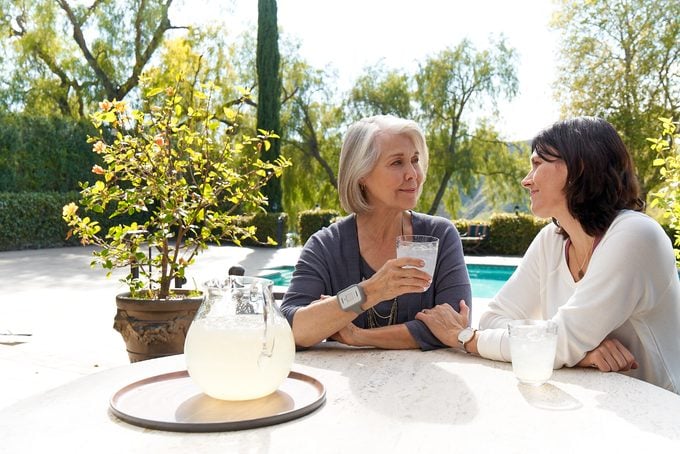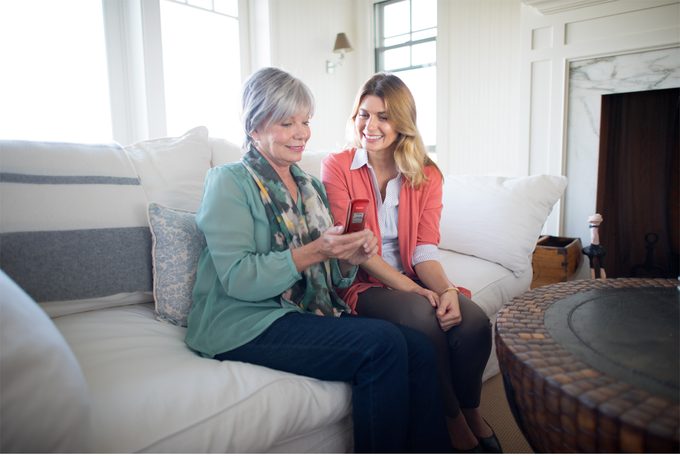How to Talk to Your Aging Parents About Their Health
Updated: Feb. 07, 2020
It may not be a simple conversation to have, but these steps make it easier.
It’s often said that your parents’ job is to make sure that one day you no longer need them. And that’s certainly the case by the time you have kids of your own, a demanding career, and a whole host of other adult responsibilities. Ironically, this is precisely the time when your parents start to need you. With the added responsibility of kids of your own, you’re now part of the all-important “sandwich generation”: the stage of life when raising your own children dovetails with caring for your aging parents.

“There’s no set time frame for when we’re going to get called into this,” says Teepa Snow, one of the nation’s leading experts in dementia and Alzheimer’s care. Like most experts, Snow says maintaining a lifelong dialogue with your parents—or, if you’ve lapsed, picking it back up while they’re still well—is crucial to building the trust relationship necessary to be effective once you actually have a cause for concern. “Talk early and often,” says eldercare author and columnist Carol Bradley Bursack, whose site Minding Your Elders helps demystify the often-difficult task of communicating with aging parents about their health.
Start with these steps.
Establish yourself as an ally, not an adversary.
Always start with an “I” statement, not a “you should” statement. Relating concerns to yourself first, then extending them to your parent, helps foster a mentality that doesn’t feel threatening. “If we can’t talk about our own [aging] process, why should we think we have a right to invade someone else’s life with this information?,” Snow asks. She recommends striking up a conversation about something you’re doing—taking up yoga to stay limber, for instance. That can lead to asking your mom what she’s doing to stay fit, and even having her commit to doing it with you. When you’re an ally day-to-day, your parents will be more apt to trust you and be able to depend on you during a health crisis, Snow notes.

Respect your parents’ dignity.
As eager as you may be to take charge, it’s important to honor the parent-child dynamic at all times. “You don’t just decide, ‘Oh my parents are old, now I can take over their lives,’” says Bursack. “Your parents are your parents until they’re gone. Do not treat them like children. Even if you find that there’s an emergency going on, you can make suggestions, but they have a right to make decisions, especially if there’s no cognitive disorder.” A great way to show respect while retaining your own peace of mind is to empower your parents to safely and independently run errands, go to doctors’ appointments, and socialize. That’s where a mobile medical alert system can become a serious asset. An urgent response device like the Lively Mobile from GreatCall lets mom or dad press an urgent-response button to access highly trained IAED certified 5Star Agents in the event of an emergency. There’s even an available fall detection feature.
Help them choose a phone they’ll love to use at home and on the go.
Bursack suggests getting into the habit of checking in on your parents with a phone call once or twice a week. Start by setting them up with a smartphone that’s designed for seniors, like the Jitterbug Smart 2, which has voice typing, a simplified menu, a big screen, and a front-facing speaker, which Snow says can be especially useful for people with cognitive decline. “What we know is that people living with dementia actually do better with visual cues than they do with just audio,” she says. “With video, now you have a face for the voice, and you can show things without saying a whole lot.” If your parents just need the basics, like making and receiving phone calls, consider setting them up with the Jitterbug Flip, which is an easy-to-use flip phone, but with bigger buttons, more powerful speakers, and a brighter screen. Staying in close phone contact will help you keep tabs on any arising health issues—it will help you pick up on glitches in their memory, too.

Be consistent—but don’t be annoying.
There’s a fine line between keeping up with your parents’ changing lifestyles and harassing them. Snow suggests finding plausible reasons to get in touch so your parents won’t feel patronized. For example, figure out a reason to call based on something you’re doing. “You can say something like, ‘You know, I was just reading this article online and it made me think of you,’” says Snow. That can open the door to dialogue instead of prying. If they have the Jitterbug Smart 2, you can even send them a link to the article after the conversation is over—and know that they’ll be able to read it. These conversations can sometimes cause friction, so it’s good to sometimes remind your parents that you are acting out of love for them.

Know when to involve professionals.
Whatever level of caretaking you assume, learn to recognize your cue to consult other experts, like a doctor, elder caregiver, or even a lawyer. A portable medical device may ensure professionals will intervene during an emergency, but what about when you need to consult experts at other times? Bursack says to open the conversation by offering a gentle suggestion like, “Dad, you haven’t had a checkup in a while. Maybe it’s time. I’ll can come with you.” Having legal discussions can be even more sensitive but just as essential. Most people wait until a crisis hits to pursue decision-making legal documents, but by then it can be too late, says elder law attorney Michael Amoruso. “The most important thing to do in advance—even if the parent doesn’t want to do any other legal planning, and they’re resistant to children’s request to do planning—is to prepare two documents,” Amoruso says. “One is assigning a health care proxy, which gives a loved one unfettered discretion to make a lifesaving or life-ending decision, such as life support. The second is a robust power of attorney that would allow the agent [the person given rights in the event of a crisis] the ability to do long-term planning that wasn’t done in years prior.”
Just as they have been there for you, helping your parents later on their lives is the least you can do. With the proper preparation and technology, like an urgent response device or the proper phone, it can get easier and feel even more rewarding.